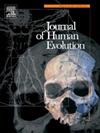来自法国曼德林石窟的一个新的尼安德特人成年个体的牙齿。
IF 3.1
1区 地球科学
Q1 ANTHROPOLOGY
引用次数: 0
摘要
曼德林石窟(Grotte Mandrin)位于法国地中海的罗讷河中游河谷,出土了 11 层更新世考古和古人类学岩层(从最古老的 J 层到最年轻的 B 层),年代从海洋同位素阶段(MIS)5 到 MIS 3。我们在此报告了一个昵称为 "Thorin "的尼安德特人成年个体的近乎完整的牙齿,该个体与后尼罗河第二期最后阶段的 B2 层(∼44.50-42.25 ka)有关。之前的古遗传学分析表明,Thorin 是一个男性个体,他与西欧其他半同期尼安德特人的遗传分化程度很深,可能发生在 105 ka ∼ 105 ka 之间。研究利用微计算机断层扫描成像技术对索林的 31 颗牙齿(包括两颗远臼齿)进行了描述和分析,并将其与其他尼安德特人和现代人进行了比较。根据对化石遗骸的直接观察和测量,并使用显微断层成像技术,研究了牙齿磨损、非度量特征、牙冠尺寸和牙齿组织比例,并通过几何形态计量学分析了 M2、M2 和 M3 的珐琅质与牙齿交界处的形状。我们的研究结果表明,索林的牙齿显示出 MIS 5-3 尼安德特人的典型牙齿特征。这也是首次报道尼安德特人有两颗远臼齿,而这一特征在现代人中十分罕见。结合该个体的遗传特征,本研究的结果意味着尼安德特人最新族群之间的形态趋同过程或低估了尼安德特人最新族群的遗传变异性。本文章由计算机程序翻译,如有差异,请以英文原文为准。
The dentition of a new adult Neanderthal individual from Grotte Mandrin, France
Grotte Mandrin is located in the middle Rhône River Valley, in Mediterranean France, and has yielded 11 Pleistocene archeological and paleoanthropological layers (ranging from the oldest layer J to the youngest layer B) dating from Marine Isotope Stage (MIS) 5 to MIS 3. We report here the nearly complete dentition of an adult Neanderthal individual, nicknamed ‘Thorin,’ associated to the last phase of the Post-Neronian II, in layer B2 (∼44.50–42.25 ka). A previous paleogenetic analysis revealed that Thorin is a male individual and that he shows a deep genetic divergence with other penecontemporaneous Neanderthals from western Europe that possibly occurred ∼105 ka. The 31 teeth of Thorin (including two distomolars) are described and analyzed using microcomputed tomography imaging and are compared with other Neanderthals and modern humans. Based on direct observation and measurements on the fossil remains, and using microtomographic imaging, tooth wear, nonmetric characters, crown dimensions, and dental tissue proportions were investigated, and the shape of the enamel–dentine junction of the M2, M2, and M3 was analyzed by geometric morphometrics. Our results indicate that Thorin's teeth show dental characteristics typical of MIS 5–3 Neanderthals. It is also the first time that the presence of two distomolars is reported in a Neanderthal individual, a trait that is rare among modern human populations. Combined with the genetic peculiarities of this individual, the results of the present study imply either a process of morphological convergence among the latest Neanderthal groups or an underestimation of the genetic variability of recent Neanderthal groups.
求助全文
通过发布文献求助,成功后即可免费获取论文全文。
去求助
来源期刊

Journal of Human Evolution
生物-进化生物学
CiteScore
6.30
自引率
15.60%
发文量
104
审稿时长
3 months
期刊介绍:
The Journal of Human Evolution concentrates on publishing the highest quality papers covering all aspects of human evolution. The central focus is aimed jointly at paleoanthropological work, covering human and primate fossils, and at comparative studies of living species, including both morphological and molecular evidence. These include descriptions of new discoveries, interpretative analyses of new and previously described material, and assessments of the phylogeny and paleobiology of primate species. Submissions should address issues and questions of broad interest in paleoanthropology.
 求助内容:
求助内容: 应助结果提醒方式:
应助结果提醒方式:


